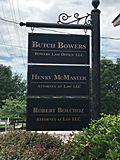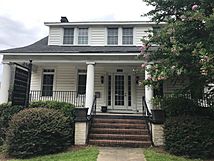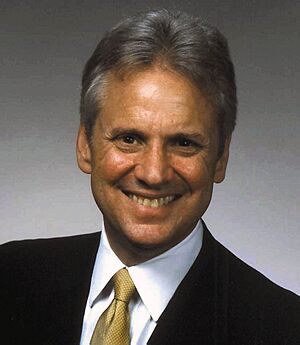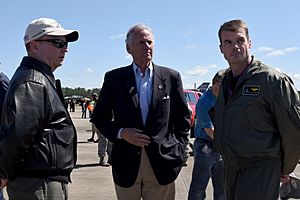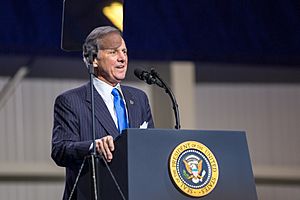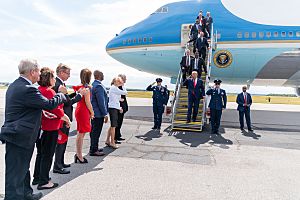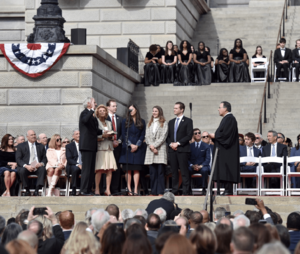Henry McMaster facts for kids
Quick facts for kids
Henry McMaster
|
|
|---|---|
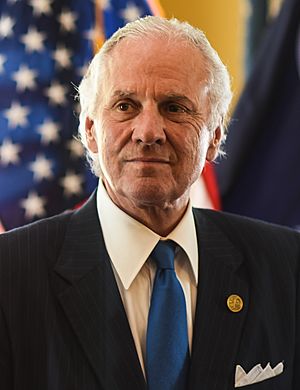 |
|
| 117th Governor of South Carolina | |
| Assumed office January 24, 2017 |
|
| Lieutenant | Kevin L. Bryant Pamela Evette |
| Preceded by | Nikki Haley |
| 91st Lieutenant Governor of South Carolina | |
| In office January 14, 2015 – January 24, 2017 |
|
| Governor | Nikki Haley |
| Preceded by | Yancey McGill |
| Succeeded by | Kevin L. Bryant |
| 50th Attorney General of South Carolina | |
| In office January 15, 2003 – January 12, 2011 |
|
| Governor | Mark Sanford |
| Preceded by | Charlie Condon |
| Succeeded by | Alan Wilson |
| Chair of the South Carolina Republican Party | |
| In office May 8, 1993 – March 28, 2002 |
|
| Preceded by | Barry Wynn |
| Succeeded by | Katon Dawson |
| United States Attorney for the District of South Carolina | |
| In office June 5, 1981 – July 1, 1985 |
|
| President | Ronald Reagan |
| Preceded by | Thomas Simpson |
| Succeeded by | Vinton Lide |
| Personal details | |
| Born |
Henry Dargan McMaster
May 27, 1947 Columbia, South Carolina, U.S. |
| Political party | Republican |
| Spouse |
Peggy Anderson
(m. 1978) |
| Children | 2 |
| Residence | Governor's Mansion |
| Education | University of South Carolina (BA, JD) |
| Website | |
| Military service | |
| Allegiance | United States |
| Branch/service | |
| Years of service | 1969–1975 |
Henry Dargan McMaster, born on May 27, 1947, is an American politician and lawyer. Since 2017, he has served as the 117th governor of South Carolina. He is a member of the Republican Party. Before becoming governor, he was the 50th attorney general of South Carolina from 2003 to 2011. He also served as the 91st lieutenant governor of South Carolina from 2015 to 2017, working with Governor Nikki Haley.
McMaster worked for U.S. Senator Strom Thurmond and as a federal prosecutor. President Ronald Reagan appointed him as United States Attorney for South Carolina in 1981. He later chaired the South Carolina Republican Party from 1993 to 2002. He was elected attorney general in 2002 and again in 2006. In 2014, he was elected lieutenant governor. McMaster became governor in 2017 when Nikki Haley resigned to become the U.S. ambassador to the United Nations. He won a full term as governor in 2018 and was reelected in 2022. On January 29, 2025, McMaster became South Carolina's longest-serving governor.
Contents
Early Life and Education
Henry McMaster was born on May 27, 1947. His hometown is Columbia, South Carolina. He is the oldest son of John Gregg and Ida Dargan McMaster.
He earned a bachelor's degree in history in 1969. This was from the University of South Carolina. In 1973, he graduated from the University of South Carolina School of Law. He was part of the South Carolina Law Review. Later that year, he became a member of the Richland County Bar Association. He served in the United States Army Reserve, leaving in 1975.
After law school, McMaster worked for U.S. Senator Strom Thurmond. This was in Washington, D.C. He then joined a law firm. He practiced law for almost 29 years. He worked as a federal prosecutor and in private practice. He represented clients in state and federal courts.
Early Political Career
United States Attorney
In 1981, President Ronald Reagan chose McMaster to be the United States Attorney for South Carolina. The Senate approved him on May 21, 1981. He led the South Carolina Law Enforcement Coordinating Committee from 1981 to 1985.
McMaster often held press conferences. He gained public attention through interviews. He finished his term as U.S. attorney on December 31, 1985.
Running for Office
In 1986, McMaster ran for the United States Senate. He won the Republican primary. However, he lost the main election to Democrat Ernest Hollings. He only won in Lexington County.
In 1990, McMaster ran for lieutenant governor. He won the Republican primary. But he lost the general election to the Democrat Nick Theodore.
In 1991, Governor Carroll A. Campbell Jr. appointed McMaster to the state's Commission on Higher Education. He also served on the board of the South Carolina Policy Council.
Leading the Republican Party
On May 8, 1993, McMaster was elected chairman of the South Carolina Republican Party. He was reelected several times. He also served on the Republican National Committee. Under his leadership, the Republican Party gained control of the governorship and the State House of Representatives in 1994. They also gained control of the State Senate in 2000. McMaster resigned as party chairman on March 28, 2002. He did this to run for attorney general.
Attorney General of South Carolina
McMaster ran for attorney general in 2002. He won the Republican primary and then defeated Democratic attorney Stephen K. Benjamin in the general election. He was reelected as attorney general in 2006 without facing any opposition.
Running for Governor and Ports Authority Role
In 2010, McMaster ran for governor but finished third in the Republican primary. He then supported Nikki Haley, who won the primary and became governor. In 2011, Governor Haley appointed McMaster to the South Carolina Ports Authority. He served there until 2015.
Lieutenant Governor of South Carolina
McMaster ran for lieutenant governor of South Carolina in 2014. He won the Republican primary runoff and then defeated Democratic state representative Bakari Sellers in the general election. He became lieutenant governor on November 4, 2014.
During the 2016 presidential campaign, McMaster was an early supporter of Donald Trump. He was one of the first elected politicians in the United States to support Trump. After Trump won the Republican nomination, McMaster gave a speech at the Republican National Convention.
Governor of South Carolina
Becoming Governor
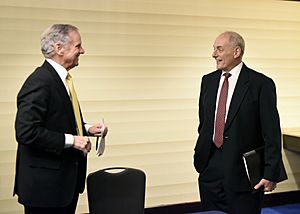
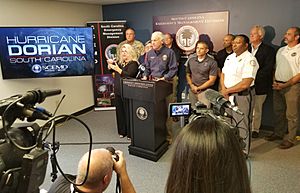
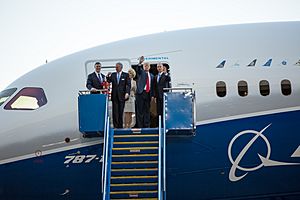
On November 23, 2016, President-elect Donald Trump announced he would nominate Governor Nikki Haley to be the United States Ambassador to the United Nations. On January 24, 2017, the Senate confirmed Haley. She then resigned as governor, and McMaster became governor. He was 69 years old, making him the oldest person to become governor in South Carolina. McMaster served the rest of Haley's term, which ended in January 2019.
McMaster ran for a full term as governor in 2018. He won the Republican primary runoff and chose businesswoman Pamela Evette as his running mate. Trump supported McMaster. McMaster defeated Democratic nominee James Smith in the general election. He ran for reelection in 2022 and won against Democratic nominee Joe Cunningham.
Key Policies
State Spending
On February 6, 2017, McMaster asked President Trump for $5.18 billion for South Carolina's roads and bridges. He also said the state government needed to spend less money. On May 9, 2017, he vetoed a bill that would have raised the state's gas tax. He believed the state had enough money for roads without a new tax. However, the South Carolina General Assembly voted to override his veto.
Firearms and Gun Rights
McMaster strongly supports the Second Amendment to the United States Constitution, which protects the right to own firearms. He supports laws that make it easier for citizens to have guns. In 2021, McMaster signed a bill allowing people to open carry a firearm with a permit. In 2024, he signed a law that allows open carry without a permit. This law also changed the minimum age for handgun ownership from 21 to 18.
Immigration Policies
In 2018, McMaster offered to send troops from the South Carolina National Guard to help Texas. ..... In 2023, he again sent South Carolina National Guard troops to Texas. .....
George Floyd Protests
After the death of George Floyd, protests happened across the nation, including in South Carolina. Some protests in Columbia and Charleston involved violence and property damage. McMaster said that state and local governments were being too soft on rioters. He sent the South Carolina National Guard to help if needed. He also sent National Guard members to Washington, D.C. at President Trump's request.
Other Important Issues
Conservation and Preservation
McMaster has supported preserving the Gullah culture. This is an African American ethnic group living in South Carolina's Lowcountry. In 2022, he declared the first week of August as Gullah/Geechee appreciation week. He also called for protecting South Carolina's natural areas from too much development and damage. He believes this helps preserve the state's culture and economy.
Governor's Record
As of May 21, 2025, Governor McMaster has signed almost 1,000 bills into law. He has vetoed 36 bills, and 24 of his vetoes have been overturned by the legislature.
|
Legislative Action
|
Total |
|---|---|
|
Bills Signed
|
976 |
|
Bills Vetoed
|
36 |
| 7 | |
|
Vetoes Sustained by Legislature
|
10 |
|
Vetoes Overridden by Legislature
|
24 |
Personal Life
Family and Home
McMaster has been married to Peggy McMaster (née Anderson) since 1978. They have two adult children and live in Columbia, South Carolina. He owns an English Bulldog named Mac. The McMaster family attends First Presbyterian Church in Columbia.
McMaster and his wife own several houses and rental apartments in the Columbia area. One of their homes is the McCord House, built in 1849. These properties are a major source of his income.
Electoral History
Henry McMaster ran for the U.S. Senate in 1986 and for lieutenant governor in 1990, but did not win. He also ran for governor in 2010 but was not successful. He was elected attorney general in 2002 and 2006. He was elected lieutenant governor in 2014. He successfully ran for governor in 2018 and was reelected in 2022.
See also
 In Spanish: Henry McMaster para niños
In Spanish: Henry McMaster para niños
 | William M. Jackson |
 | Juan E. Gilbert |
 | Neil deGrasse Tyson |


